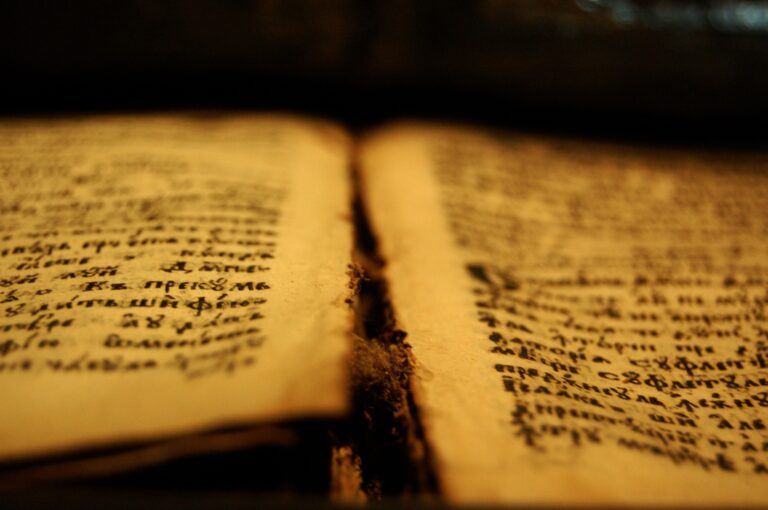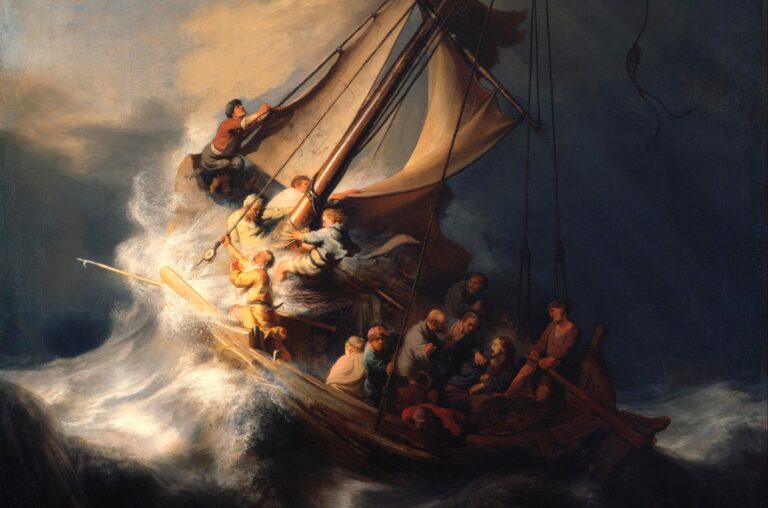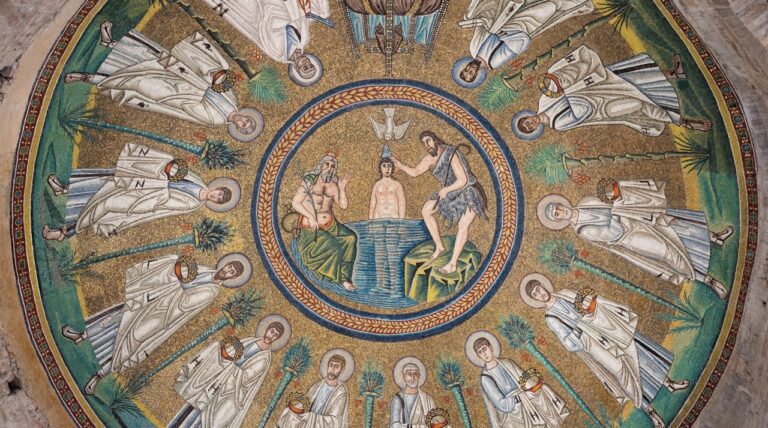This is the third installment of our series on the Nicene Creed. You can read Part 1 and Part 2, here and here.
This post will look at one of the more controversial elements of the Creed, a single word found in the final section on the Holy Spirit, filioque, which is Latin for “and the Son.” Filius being the Latin word for “son” and que, being a Latin suffix added to the end of the word to mean “and.” The addition of this clause amounts to a different nuance regarding the procession of the Holy Spirit. Does the Spirit proceed only from the Father or from the Father and the Son (a doctrine called “double procession”)? The Creed was originally written in Greek and in the Greek versions of the Creed, you will not find the filioque clause. Philip Cary writes that “Very early on, there was a standard Latin translation of the Nicene Creed that ended up…with a few differences from the Greek version, one of which is trivial, another interesting, and the third tragic.”[1] The filioque is the tragic difference. It is this difference that was one of the reasons for the Great Schism in 1054 between the Eastern and Western Churches.
Questions arise at this point. I thought the Nicene Creed was an ecumenical creed, so wouldn’t that require the whole church to approve? How did the filioque end up in the Nicene Creed if the whole church did not approve? Why did the churches divide over something seemingly so obscure? Why would such a small difference result in a great schism? What is the significance of the difference?
The story of how the clause got into the Creed
The filioque clause was officially adopted at the Third Council of Toledo (Spain) in 589. This was a local council (in contrast to an ecumenical council) that was responding to a pastoral challenge concerning Arianism. For more on Arianism see the previous post titled “There Once Was a Time When Christ Was Not.” The short story goes like this:
In the 4th century, Goths had converted to an Arian version of Christianity. As they moved farther west over the next couple of centuries, they increasingly encountered a Latin Christianity that was staunchly opposed to Arianism. Finally, the Visigoth King, named Reccared, converted to Catholic Christianity in the second half of the sixth century, thanks to the persistent efforts of Bishop Leander of Seville. The problem was that a large swath of Reccared’s kingdom was still Arian. Leander and Reccared called a local council in the hopes of avoiding schism. Few Arians attended which allowed the Council of Toledo to declare in favor of Catholic Christianity, in support of the Nicene Creed (against Arianism). The approved version was a Latin translation that included the filioque clause. DeYoung argues that it is unlikely that they thought they were doing anything novel. The version they approved was almost undoubtedly already in circulation among the Latin-speaking Christian churches. The Council was attempting to establish unity between the Greek Church and the rest of the Roman Empire, assuming that the Latin translation they were using was a faithful translation of the Greek version. Tragically, it was not. The result was that the Council of Toledo had approved a version of the Creed that the Eastern Church had not approved.[2]
The Latin version that was approved at Toledo in 589 would grow in influence and popularity until it was eventually adopted fully by the Western Church in the 11th century under Pope Benedict VIII. It was at this point that the conflict emerged a major point of tension between the Eastern and Western Churches.
Is the difference worthy of schism?
The rejection of the filioque clause by the Eastern Church is multifaceted but the first major concern of the East was that the Western Church approved a change to an ecumenical council without the consent of the whole church.[3] Moreover, at the time of the addition (in the 6th century), the Eastern church was stronger in virtually every sense with more people, churches, money, and the most important bishoprics. This addition by the Western Church was a slap in the face.
In my reading on the subject (which admittedly, is limited), many do not see the difference as a matter worthy of separation. To quote Cary, again, on the filioque:
“It is, to use another technical term, a theologoumenon: a theological proposition that many of us think is true, but which is not a teaching that you have to believe in order to be a faithful Christian. We can affirm its truth while also insisting that it is in a very important sense, optional. Therefore it should not remain in the Creed, and like many Western theologians who think this way, I do not say the words ‘and of the Son’ which I recite the Creed.”[4]
Even still, the differences are real. Kevin DeYoung in his book on the Creed, writes:
“The difference between the Eastern position and the Western position is real. The way that Eastern Orthodoxy focuses their worship on the piety and worship of the Father probably has something to do with their rejection of the filioque clause… Likewise, the way the Catholic and Protestant churches in the Western tradition focus their piety and worship on Jesus Christ, the Son, probably has something to do with their acceptance of the filioque clause… The issues here are more than semantics.”[5]
What is the significance of the filioque?
For many today, giving deep thought to the inner workings of the Trinity, may seem like an impractical waste of time. I assure it is not. The Trinity is at the very heart of our faith as Christians. In the words of Matthew Reeves, “To know the Trinity is to know God, an eternal and personal God of infinite beauty, interest and fascination.”[6] If these nuances are uninteresting to us, it may be because our senses have grown dull to the glory and beauty of the awesome Triune God!
The church across the centuries has certainly not thought of these distinctions as unimportant. For example, Photius, widely considered by the Eastern Church to the be the most influential church leader since Chrysostom, charged the Western Church with heresy in 867, over the issue of the filioque.[7] Whether or not the charge of full blown heresy is warranted, is debatable, but to say that the processions of the Spirit are of no significance would be out of step with the convictions of a great many great Christians across history.
So what is the significance of the filioque? DeYoung’s short book on the Creed gives a concise summary of what is at stake. He gives three concerns on each side of the conversation. First, on the side of the East he outlines their concerns as follows:
(1) The Eastern Church sees the Bible as teaching a single procession of the Spirit (John 15:26).
(2) The Eastern Church argues that the filioque clause undermines the primacy of the Father. No one but God the Father can be the “cause” of another person of the Trinity. How can the Son be the cause of the Spirit, even if only in part? That would seem to make him a kind of Father too and would make the Spirit less than the Father and the Son.
(3) The Eastern Church finally, as mentioned above in the previous section, wants to preserve the Father as the first person of the Trinity. They want to protect his “firstness”—the “monarchy”—of the Father as the sole source of the Godhead. The filioque destroys the firstness of God the Father, in their reasoning.
Next, DeYoung outlines the arguments of the Western/Latin Church in three arguments as well.
(1) The Western Church asserts that passages like John 20:22, portray Jesus as giving the Spirit. Moreover the Holy Spirit gives witness to the Father and the Son (Romans 8:16-17). In Galatians, Paul calls the Holy Spirit the Spirit of the Son (Gal 4:6). The filioque clause establishes a clear connection/relationship between the Spirit and Son. Without the clause it appears that there is no relationship between the Son and the Spirit.
(2) The Western Church argues that the passages above reveal something of the eternal life of God, not just the workings of the Trinity in time and space. The Son gives the Spirit at Pentecost (John 16:7), so this must be a revelation of how the Spirit can and does come forth from the Son in eternity, also, the West reasons. The Eastern Church disagrees.
(3) Finally, and most importantly, the Western Church wanted to strengthen its position against the Arian heresy (mentioned above). The filioque clause protected the consubstantiality of the Father and the Son. They saw this as the most important contribution of Nicaea in the first place: that the Son is homoousios (same substance or essence) with the Father, and not a lesser deity.[8]
Is there a way forward?
In the end, while the differences are significant and have real implications, there may be a way forward. Cary argues that there are interpretations of the filioque that the East will accept, like the concept of the Spirit proceeding from the Father through the Son (although the Western doctrine of “double procession” does actually intend to argue more than this, Cary says). However, in Augustine’s standard explanation of the double procession of the Spirit from both the Father and the Son, he asserts that the Son is not a separate source of principle from the Father, as if he were operating apart from the Father. In other words, since the Father begets the Son, all that the Son is comes from the Father. The only thing he does not receive from the Father is being the Father. That being said, even the power to be that from which the Spirit proceeds, comes from the Father.[9] Perhaps this way of articulating the double procession seems to preserve the Eastern Church’s concern for the firstness or primacy of the Father, that He be the source of the all that is divine? [10]
Whatever you make of the filioque clause in the Nicene Creed, my prayer is that this discussion may deepen your interest in pondering the deep things of God.
—————————————————–
[1] Philip Cary, The Nicene Creed: An Introduction (Bellingham, WA: Lexham, 2023), 9.
[2] The story is told in Kevin DeYoung’s book: The Nicene Creed: What you Need to Know about the Most Important Creed Ever Written (Wheaton, IL: Crossway, 2025), 63-65.
[3] Rev. Dr. Duane Miller says in an interview at The Anglican Compass: “The Orthodox Church, which still uses the original version of the Creed, sees the Filioque as a Western innovation that violates the unity and authority of the ecumenical councils. For them, this isn’t just a theological nuance—it’s a breach of trust.” See https://davidroseberry.substack.com/p/and-the-son-a-conversation-about.
[4] Cary, The Nicene Creed, 186.
[5] DeYoung, The Nicene Creed on pages. 67-68.
[6] Matthew Reeves, Delighting in the Trinity: An Introduction to the Christian Faith (Downers Grove, IL: IVP, 2012), 12.
[7] Earle Cairns, Christianity Through the Centuries: A History of the Christian Church , 3rd Edition, Revised and Expanded (Grand Rapids, MI: Zondervan, 1996), 196.
[8] The Arians preferred the word homoiousios (similar substance or essence), which denied Jesus co-eternality with the Father, thus denying him true divinity.
[9] See Cary, The Nicene Creed, 186-188.
[10] DeYoung also expresses reasons for hope that the East and West can come together over our understanding of the processions. See his thoughts on pages 68 and 69 of his book The Nicene Creed.



